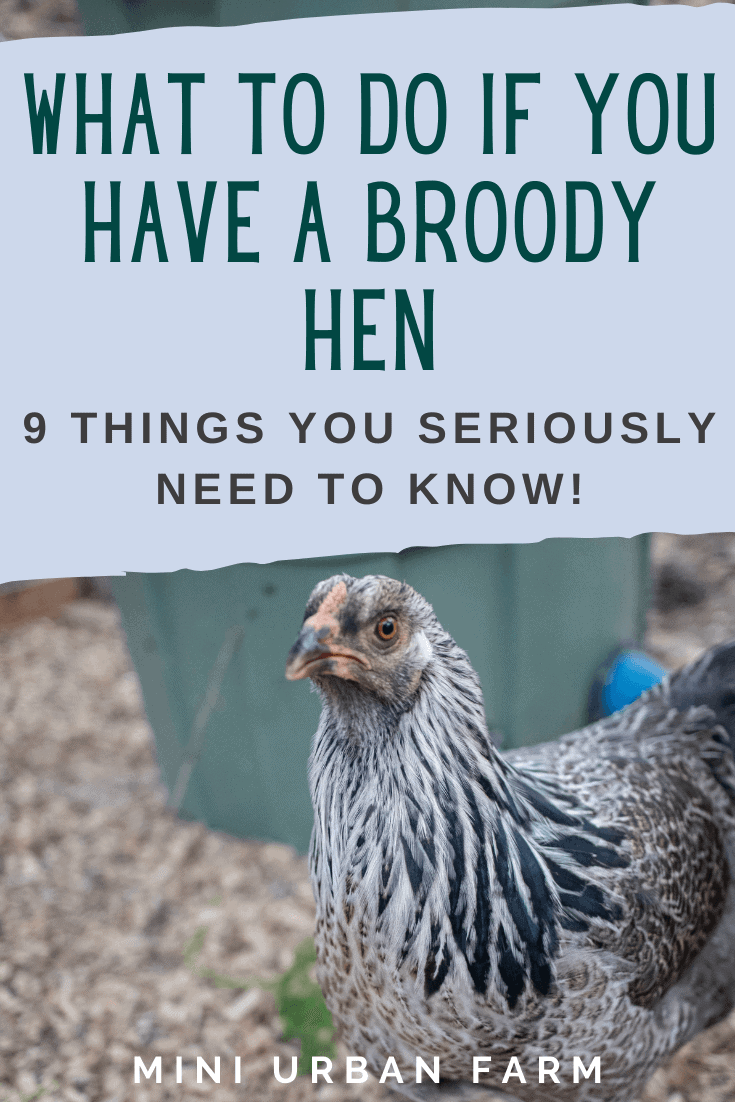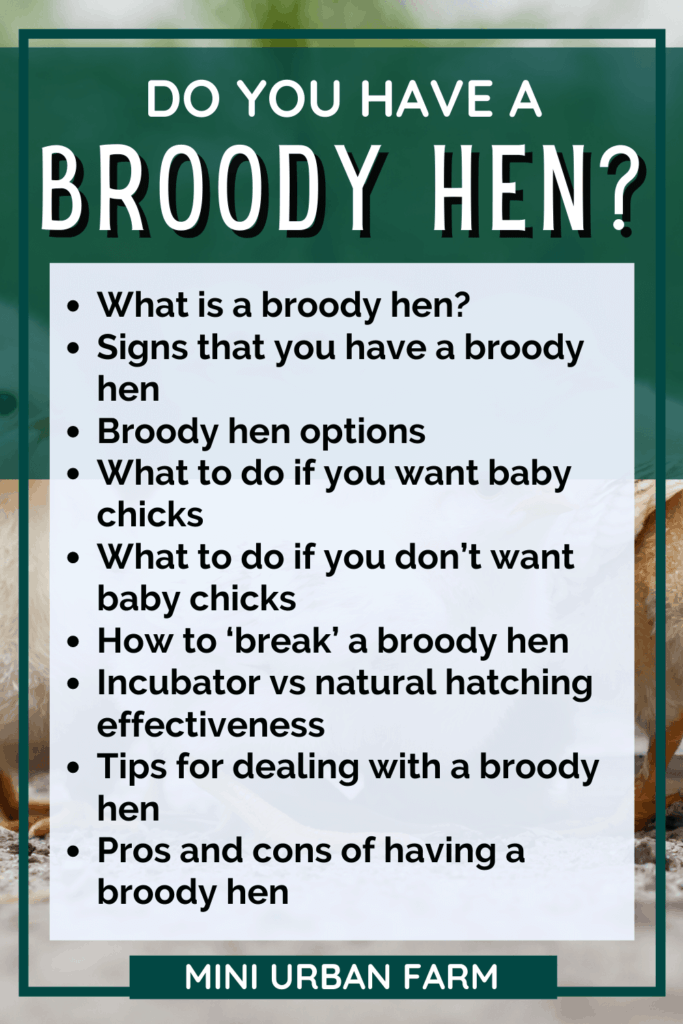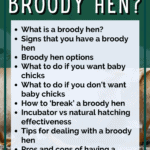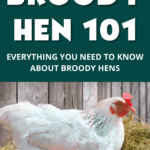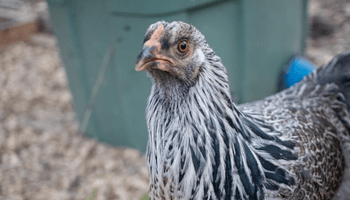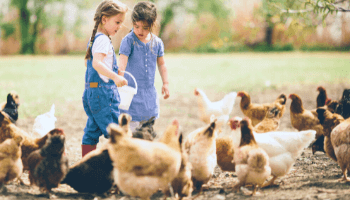Keeping backyard chickens is a great way to provide fresh eggs and meat for your family. But what happens when all of a sudden one of your hens insists on hatching out her own eggs? Well, if you want her to hatch chicks, then that’s fine. But if you don’t you can take some measures to prevent it from happening. Overall, you have a few options. Here’s what to do if you have a broody hen. Plus, how to decide if you should let her go broody!
What To Do If You Have A Broody Hen
- What is a broody hen?
- Signs that you have a broody hen
- Broody hen options
- What to do if you want baby chicks
- What to do if you don’t want baby chicks
- How to ‘break’ a broody hen
- Incubator vs natural hatching effectiveness
- Tips for dealing with a broody hen
- Pros and cons of having a broody hen
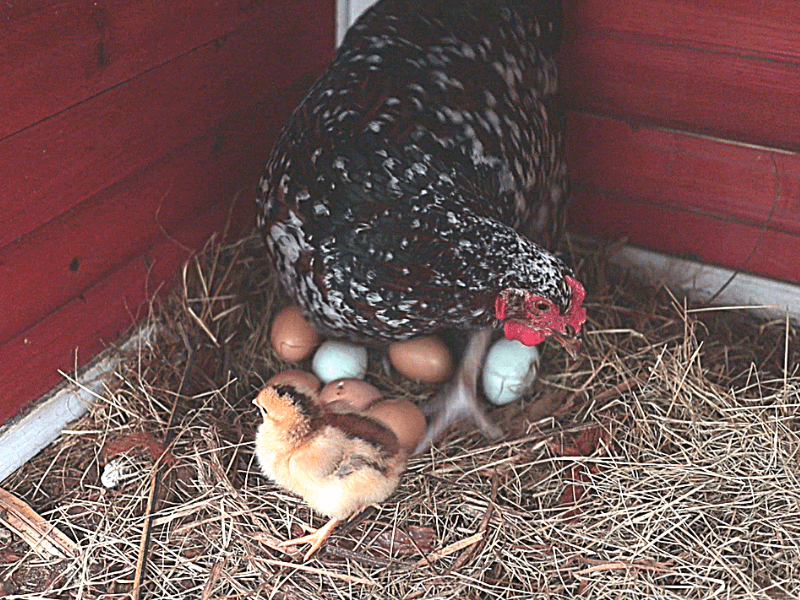
Disclosure: This post may contain affiliate links. If you purchase a product through one of our affiliate links we make a small commission from the sale at no extra cost to our readers.
WHAT IS A BROODY HEN?
In hen language, being broody means that a hen’s maternal instincts have kicked in and she wants to incubate a clutch of eggs.
Broodiness in hens is a natural occurrence and there is nothing you can do to get a hen to brood if she doesn’t want to.
There are a few different chicken breeds that are more prone to broodiness, but that’s a story for another day.
In my experience, once a hen decides to go broody, there’s little you can do to “break” her out of it. For example, I have a few hens that go broody every time they even see a clutch of eggs.
Despite my best efforts.
It’s up to you to decide if you should let this behavior play out – and for me, that changes depending on the time of year, and how many new chicks I want!
SIGNS THAT YOU HAVE A BROODY HEN
It’s pretty easy to tell if you have a broody hen. In fact, I picked up on it right away once my Speckled Sussex went broody.
When I tried removing her from the nesting box she was sitting in (I wanted my daily eggs) she became defensive, hostile, and her feathers puffed up – and then she tried to peck at me.
Now normally she is pretty docile.
But she was obviously protecting her eggs, and she didn’t want me anywhere near them!
More obvious signs the you have a broody hen are:
- She won’t budge from the nest. Try as you may, you may not succeed in getting her to leave the nest
- She keeps running back to the nest. Even when you succeed in physically removing her, she may keep running back
- She plucks feathers from her breast to provide the eggs with warmth and moisture
- She is hostile. She flares her feathers up when you come close to her, growls, and may even peck at you
- Her poop changes. When a broody hen does her number two, it is different from the small compact normal poop. It is huge and splattery, and the smell is pretty bad.
- She flattens herself to protect the clutch
- You’re getting less eggs – during your hen’s broodiness she won’t lay any more eggs. Which means less eggs for you!
If you see these signs, congratulations, you have a broody hen!
BROODY HEN OPTIONS
Before we left for a short weekend trip, we did not ask anyone to collect eggs, and our hen decided to act on her maternal instincts and sit on a clutch of eggs.
She was sitting on about 13 eggs when we came back and we did not try to separate her from them (because omgosh baby chicks are so cute!)
One of our other hens caught the brooding bug too and ended up setting on her own little clutch of four eggs.
And even though we didn’t need any more chicks, I couldn’t get the second broody hen to stop.
So we left them both.
And eventually we did get a few chicks, but nowhere near the 13 chicks we were expecting!
(Ever heard of the old adage, don’t count your chicks before they hatch?)
So basically, if you have a broody hen you have 2 options.
- You can leave her be (and hopefully get some new baby chicks)
- Or you can remove her from the nest and take her eggs
Keep in mind that removing her eggs will not stop her from being broody – she will just keep looking for new eggs to sit on!
WHAT TO DO IF YOU WANT BABY CHICKS
If you’re looking to let your hen hatch out some chicks, there are a few things you can do to help make that happen.
You see, hens are very domesticated. So even though they do have maternal instincts, they are not perfect.
A hen may sit on her eggs for 10 days, then abandon the nest out of nowhere.
So while you might get a hen that can hatch out a bunch of chicks, you might also get one that only hatches out a few lucky eggs – or none at all!
In this scenario, you have 2 options – but first – make sure you actually have fertile eggs! And obviously if you don’t have a rooster, those eggs won’t be fertile no matter what!
If you do have fertile eggs, you can either let the hen try to hatch them herself. Or you can take those eggs and put them in an incubator.
Now, I’ve done both – and both are a great experience.
Although we definitely had more success with the incubator!
Letting Your Hen Hatch Her Own Eggs
Number one, ensure you provide sufficient food and water so that the hen does not have to leave the clutch for prolonged periods of time to go find food.
If the eggs are left unincubated for long, they get cold and can die.
To ensure this does not happen, keep food and water close to her so that she only takes a break to relieve herself.
And if your broody hen does not eat, remove her from the nest and bring her to her food.
Because if she doesn’t get enough food and water, her health may deteriorate. And in hot weather, she may suffer dehydration or heat stroke!
Hens sit on eggs for the 21 days it takes for them to hatch, completely neglecting themselves, so it is important to keep an eye on your broody hen!
On days 19-21 it may be a good idea to separate the broody hen and her eggs from the rest of the flock. Just to make sure none of the other chickens get aggressive with the new chicks!
Finishing With an Incubator and Brooder
If you did not know, not all broody hens become good mothers, some abandon the nest after a few days or weeks.
Others are homicidal and kill the baby chicks that do hatch – believe me, it’s not a pretty sight!
So if you are worried about either of these, it may be a good options to finish hatching those eggs in an incubator.
We’ve done this a few times now after our broody hen abandoned her nest – and had great success.
To go this route, you have to know a few basic things.
One – all chicken eggs take about 21 days to hatch.
Two – how long was your hen sitting on those eggs?
In my case, the hen sat on her eggs for about 5 days (while we were on vacation.)
So 21 days minus 5 days = 16 days left to hatch.
Now include the “lockdown” time. I.e – the last 3 days of hatching.
So I took my clutch of started eggs, incubated them for about 13 days at normal temperature and humidity, and then put them in lockdown for the last 3 days.
And voila! 10 out of 10 baby chicks hatched!
Also, don’t forget to have the brooder ready when you hatch your own chicks!
And keep it on standby just in case you notice your new mama hen getting aggressive or neglectful with her babies!
WHAT TO DO IF YOU DON’T WANT BABY CHICKS
If you’re not sold on the idea of even more chickens, you might not want to let her go broody.
A broody hen could mean trouble for your egg supply. As she won’t be laying any eggs while she’s sitting on her clutch!
So if you don’t need more chicks, want to keep your eggs coming, or your hen is sitting on unfertilized eggs, you’ll have to stop it from happening.
Weaning your hen off the brooding behavior, also known as ‘breaking’, can help her get over the instinct to brood.
But don’t hold your breath!
Some hens will never go broody, and others won’t stop trying to sit on eggs!
In this case, the only thing you can do is to take away those eggs!
HOW TO ‘BREAK’ A BROODY HEN
Broodiness in hens is a natural occurrence that has nothing to do with you, but if you are done wanting baby chicks, there are things you can do to stop her from hatching eggs!
- Remove her from the nest. You can put her in a separate, uncomfortable place with a lot of light or back with the others in the pen. But it is not as easy as it sounds and she will likely keep flocking to her empty nest
- To avoid temporary beak-shaped tattoos on your hands, wear gloves when you’re handling a broody hen because they’re known for their aggressive and territorial behavior. And they definitely are not shy to peck you when you get too close
- Close the nest area temporarily. She may try to open it, and if she can’t, it may alert her that it is not time to brood and snap out of it
- Remove the nesting material. In case she manages to come back, she wouldn’t find the soft nest she’s used to.
- It is said that putting a cold water bottle or a bag of ice cubes underneath her can help cool her down and snap her out of broodiness. I haven’t tried this one but it might just work!
INCUBATOR VS NATURAL HATCHING EFFECTIVENESS
When I first wanted baby chicks, my instinct was to order them from a hatchery.
But those day old baby chicks that get shipped across country often end up dying due to dehydration or other health issues. (It’s not natural to sit in a box for 48 hours without food and water!)
So if there aren’t any farm stores around you to buy new baby chicks, you have 2 options.
Either hatch out your own, or let your hens do the work for you!
Of course, if you don’t have a rooster this won’t be possible.
Incubators are far more effective than hens when it comes to hatching – for several reasons:
- You control the temperature and humidity
- You can hatch more eggs at once depending on the size of your incubator
- The chicks (and eggs) are safe from predators such as snakes
- You can hatch any time you want instead of waiting for hormones to decide
- You get to watch as baby chicks hatch to life (and can fix any problems)
That is not to say that hatching your chicks naturally with a hen is not effective. You just might have to help her – or be prepared for failure if she can’t figure it out!
And if you want to watch exactly how I set up my incubator, I made an entire video about it!
TIPS FOR DEALING WITH A BROODY HEN
A broody hen can be calm but can also get aggressive if she feels threatened. These tips can help you deal with her without getting your eyes pecked out:
- Don’t interfere. If you give her her space, you will have no problems
- Don’t overcrowd her with too many chickens in the coop
- Keep her nest clean and comfortable
- Give her plenty of food and water
- Make her environment safe from predators
PROS AND CONS OF HAVING A BROODY HEN
As with everything else under the sun, a broody hen has her pros and cons.
Pros
- You don’t need to find an incubator because the broody hen is the natural incubator
- No electricity costs to run the incubator
- You get baby chicks with little effort
- No need to keep a brooder because the mama chick will care for them after hatching
Cons
- Lower hatch rate
- High mortality rate of new chicks
- Less eggs to eat while your hen is broody
- The hen gets aggressive and may injure you
- Some hens kill their baby chicks or abandon them, which may cause harm to the little ones unless you have a brooder to rescue them
Using these tips for what to do if you have a broody hen, you can decide for yourself if you want to try and break her, or allow her to become a mama hen! I love watching new chicks hatch, no matter where they hatch! And if you’re not concerned about getting less eggs, it might just be a great experience for your homestead!
Pin What to do if you have a broody hen!
